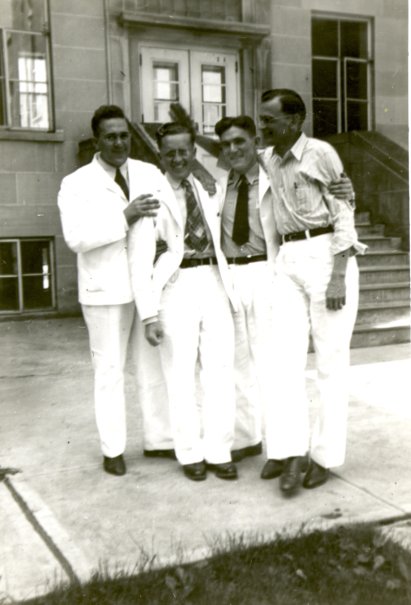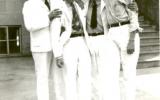CPS Unit Number 086-01
Camp: 86
Unit ID: 1
Title: Mt. Pleasant State Hospital
Operating agency: MCC
Opened: 2 1943
Closed: 9 1946
Workers
Total number of workers who worked in this camp: 48
-
 CPS Camp No. 86Civilian Public Service, camp 86, Mount Pleasant, Iowa.Box 2, Folder 12. MCC Photographs, Civilian Public Service, 1941-1947. IX-13-2.2. Mennonite Central Committee Photo Archive
CPS Camp No. 86Civilian Public Service, camp 86, Mount Pleasant, Iowa.Box 2, Folder 12. MCC Photographs, Civilian Public Service, 1941-1947. IX-13-2.2. Mennonite Central Committee Photo Archive
CPS Unit No. 86, a Mental Hospital unit at Mt. Pleasant State Hospital in Mt. Pleasant, Iowa operated by Mennonite Central Committee, opened in February 1943 and closed in September 1946. The majority of the men served as ward attendants.
Mt. Pleasant State Hospital was located in Mt. Pleasant, Iowa, and housed sixteen hundred patients.
The hospital operated as a self-contained community with its own powerhouse, kitchen, laundry, farm and dairy, administrative offices, medical facilities as well as residential, therapeutic and educational facilities.
A 1944 study by MCC found that equipment and supplies were scarce, much of the equipment worn out, the wards were gloomy and badly in need of repairs. Many viewed the hospital as one of the most undesirable hospitals in which CPS units worked.
Directors: Earl Leinbach, Harold Mishler, Willard Friesen, James Lapp, Vernon Decker
In the summer of 1945, of thirty-three men assigned to the unit, twenty-seven were married. Nineteen wives worked either at the hospital or in the community.
When entering CPS, most of the men in Mennonite camps and units reported religious affiliation with a variety of Mennonite groups and conferences. In 1944, of twenty-five assignees, twenty-three were Mennonite, the roster included Old Mennonite, General Conference Mennonite, Church of God in Christ Mennonite, Mennonite Brethren, and Full Gospel affiliations. The different conferences varied in their beliefs and practices.
The hospital had been short-handed for some years, and experienced many personnel changes leading up to the war. Mount Pleasant employed sixty-six attendants rather than a normal staff of one hundred and twenty-five to care for the sixteen hundred patients. Of the thirty-three men in the CPS unit, twenty-nine served as attendants.
The attendant’s job included completing patient reports, escorting doctors and supervisors on rounds of the wards, seeing that patients were properly dressed and fed, distributing medications, supervising ward housekeeping, and keeping discipline and order in the wards. Attendants were to keep patients from injuring themselves or others.
The 1944 MCC study reported that men worked fifty-seven hours per week from 6:00 am to 7:00 pm with two and one-half hours off for meals and breaks for six days, with the seventh day off, and every fifth Sunday off. Those on night duty worked twelve hours for six nights a week.
Russell Schertz wrote some fifty years later about his experience at the hospital.
As I encountered the deplorable conditions on the mental hospital wards—unsanitary filth, patients tied to chairs, in straight jackets, locked in dingy rooms, and sometimes beaten by previous attendants—I became aware that this was an issue of justice.
Change was accomplished by trying to make patients clean and comfortable and by showing love and compassion. Such an approach resulted in a changein behavior and personality of the patients. After a time this change was noticed by both families of the patients and the hospital administrators who became more supportive of what we were doing. (“Detour . . . Main Highway”: Our CPS Stories pp. 54-55)
Since the unit was located near the Mennonite communities of Donnellson and Wayland, young people from the churches, as well as ministers, often came for regular Sunday evening services. They gave programs and invited assignees and their wives into their homes.
Iowa Wesleyan University, not far from the hospital, opened the swimming pool for unit use. Faculty members often accepted invitations to speak for unit activities.
A group of Methodist ministers at a convention in town visited with some CPS men and two wives on July 6, 1944. They discovered a certain amount of dissatisfaction among them. As a result, one of the ministers, L. L. Dunnington, pastor of the First Methodist Church of Iowa City, launched an attack against the hospital administration on work conditions, CO training, and patient care through a letter to the editor in the Des Moines Register on July 31.
The situation at the hospital became very tense as Superintendent Soucek, very sensitive about poor public relations, became indignant. The hospital board wanted an apology, regular employees felt they had been treated unjustly, and families of patients were upset.
Albert Gaeddert of Mennonite Central Committee (MCC) was alerted and Dick Reuter of the National Service Board for Religious Objectors (NSBRO) visited the unit on August 2. Ralph Beechy, MCC central states regional director, visited the next day. The men had not wanted their statements to be made public and also felt that some of the statements were misleading. Earl Leinbach, the unit director, did not feel comfortable challenging the hospital nor in contradicting the minister in the press. The unit wanted desperately to mend fences.
On August 3, Leinbach sent a letter to the Board of Control of State Institutions to the effect that the publications do not reflect the feelings of the unit “as a whole”. At the same time he expressed appreciation for help from administration and employees in adjusting to their jobs of serving patients.
The next day the thirty members of the unit issued a mimeographed letter to all hospital employees, expressing regret that they had not authorized publication of the statements, that some were incorrect, that the letter did not reflect the views of the entire unit, and they desired to be of greater service to the patients.
The incident continued to play out in both The Des Moines Register and the Iowa City Press-Citizen with letters going back and forth for several days. By mid-August, the controversy died down after Robert Kreider of MCC visited the hospital and talked with Superintendent Soucek. His visit coupled with the CO’s apology to the regular employees seemed to ease the tensions.
The incident also provided opportunity for the unit to process the impact of the long hours and stressful conditions on the attendants, as well as the impact and risks of talking with others about the experiences in the hospital.
On November 26, when Reverend Dunnington called upon the Iowa governor to conduct an overhaul of “the state’s insanity hospitals and institutions for the feebleminded”, Soucek took the article quite calmly.
In a 1988 survey inviting COs to reflect back on their experiences in CPS mental health units, one man recalled the following experience:
A most unusual discriminatory stance was reported to have been taken by the superintendent of the Mount Pleasant State Hospital. . .when interviewing prospective candidates for inclusion in a CPS unit to be assigned to his institution, from among a group of Mennonite young men. The particular young man he was addressing had a beard. The superintendant offered to accept the young man, provided he would agree to remove his beard. The CO replied that if the superintendent wanted him, he would also have to take the beard. The superintendent relented and approved his application. Three months later, when the two had a chance meeting, the superintendent remarked that at the time he was interviewing for the unit, he did not want any bearded men in the group. “But as of now, if you want to have a beard that grows down to your belt, that’s okay with me. You’ve proved to me that you’ve worked out well, and have earned the respect of the hospital community.” (Sareyan p. 241-42)
For more information on this unit and other mental health and training school units, see Melvin Gingerich, Service for Peace: A History of Mennonite Civilian Public Service. Akron, PA: Mennonite Central Committee printed by Herald Press, Scottdale, PA 1949, Chapter XVI, pp. 213-251.
For more information on women COs see Rachel Waltner Goossen, Women Against the Good War: Conscientious Objection and Gender on the American Home Front, 1941-47. Chapel Hill, NC: The University of North Carolina Press, 1997.
For personal stories of CPS men, see Peace Committee and Seniors for Peace Coordinating Committee of the College Mennonite Church of Goshen, Indiana, “Detour . . . Main Highway”: Our CPS Stories. Nappanee, IN: Evangel Press, 1995, 2000.
See also Alex Sareyan, The Turning Point: How Persons of Conscience Brought About Major Change in the Care of America’s Mentally Ill. Scottdale, PA: Herald Press, 1994.
For an in depth history of conscientious objection in the United States, see Mulford Q. Sibley and Philip E. Jacob,Conscription of Conscience: The American State and the Conscientious Objector, 1940-1947. Ithaca, NY: Cornell University Press, 1952.
Swarthmore College Peace Collection, Camp publications database
For more in depth treatment of the mental health and training school units, see Steven J. Taylor, Acts of Conscience: World War II, Mental Institutions, and Religious Objectors. Syracuse, NY: Syracuse University Press, 2009.
